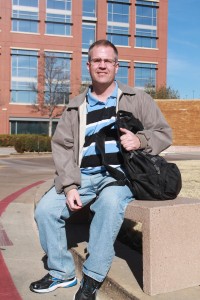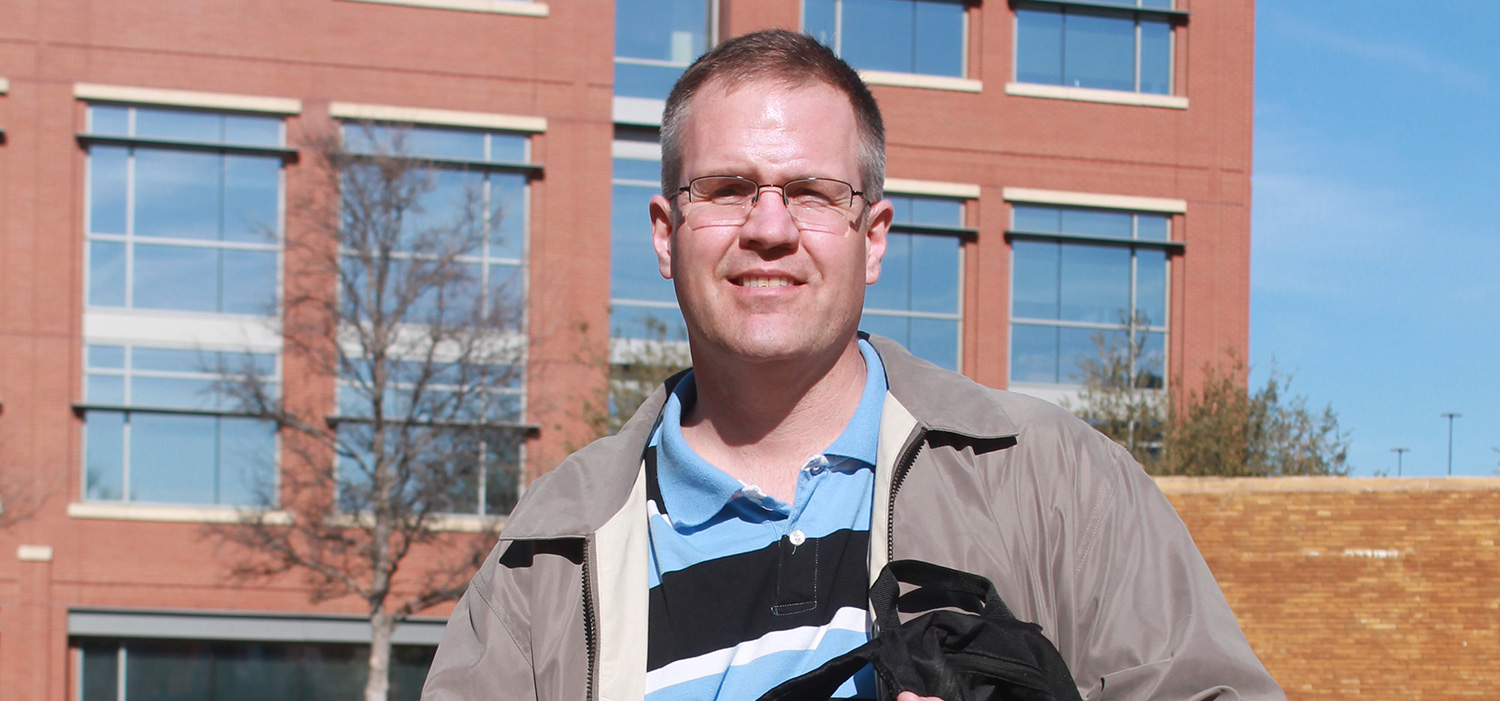By Karen Gavis/editor-in-chief

Photo by Haylie Jones/The Collegian
A section of the Tarrant County Jail’s window pane covering had been scratched off.
Patrick Johnson recalls looking out that window at a fountain that is now part of TR Campus without a clue he would one day be attending college on the other side of the street.
After his stint in jail, Johnson was living at Fort Worth’s Union Gospel Mission when he saw a sign advertising TCC’s Visions Unlimited, an outreach program for the homeless.
“It was a good transition from, well, a despairing situation into some kind of hope,” he said. “They provide lunches and bus passes. It’s good for people to get reactivated into a structured environment.”
Before becoming homeless, Johnson had lived with his mother. When she died in 1996, he moved in with his father, who died in 2001. Johnson said both his parents had bachelor’s degrees, were educators and had died of cancer.
After receiving an inheritance from his father, Johnson quit his job and “went through” the money, he said.
“I could have never gone to school the way I was,” he said. “I wasted 20 years of my life. I never married. I never did anything but go from job to job.”
Even as a teen, Johnson had been an alcoholic.
“I was as bad as they come,” he said. “It was more than drinking too much.”
Johnson, who is bipolar, said when he drank, he became erratic, belligerent and would get into trouble. His scars bear witness to what he calls “altercations.” Besides numerous stitches, Johnson’s nose was broken a few years ago, and he once woke up in the hospital with a concussion, bleeding from his right ear and lost hearing in that ear.
Speaking of the concussion, he said, “I was intoxicated. I went to a party, and I wasn’t invited and said something I shouldn’t have.”
Then in 2008, he was arrested on a drug charge. The night he was arrested, Johnson had been trying to visit a woman whom he had done drugs with before, he said, but because he was so drunk, the police were called.
“Really, getting arrested was the best thing that’s happened to me because I wouldn’t have changed,” he said. “That was a catalyst to change my life. When I was in jail, I was determined to do something different.”
When Johnson was first booked into jail, police did not find drugs but pulled them from a fifth pocket after searching him again before he left. This increased charges against him from what would have been only disorderly conduct.
“I did like everybody else and said, ‘That isn’t mine,’” he said. “I could’ve flushed it, but I didn’t know it was in there. I was so hungover.”
Johnson received deferred adjudication, went to a treatment facility and later Union Gospel Mission. The experience, he said, motivated him to quit drinking.
On March 20, he will have five years sobriety.
“I’m not proud of where I came from, and I’m not ashamed of it either,” he said. “I see less and less people that remember those days.”
Since joining Visions, Johnson has formed new relationships, and TCC has been a big part of it. South Campus served as sort of a sanctuary for him, he said.
“I didn’t want to go back home to what I was living in on Lancaster [Avenue],” he said. “I wanted to stay there. I spent a lot of time at that school in the library. It was a new world for me.”
And that new world had its challenges.
As a child, Johnson had been blinded in his right eye. While at the mission, he suffered from an inflammation in his other eye and was worried he might go blind.
“The reason I got it was because I still had my old eye. I should have had it taken out,” he said. “In the middle of Visions semester in March, I had my eye taken out.”
Johnson said learning about computers was also a challenge that he and other Visions students from earlier generations faced. However, he enjoyed taking English Composition ll with South instructor Larry Huff.
For the class, Johnson wrote a paper comparing the similarities of Fort Worth’s Lancaster Avenue to Cannery Row in Monterey, Calif.
“That’s our Cannery Row,” he said. “People I knew from reality, I compared to each one of the characters in Cannery Row.”
Huff described Johnson as an amazing and engaging scholar.
“Ask him to go a mile, and he goes two,” he said. “Always, Patrick took the high road on any writing assignment … he was a class leader and fun to work with.”
In December, Johnson earned an Associate of Arts degree, graduating from TCC with high honors, and he is now working toward an Associate of Science degree.
He recently spoke at the TCC Foundation’s annual scholarship awards banquet on TR Campus and received an Investment in the Future scholarship from the Foundation.
“Patrick’s story was truly inspirational, and we were so pleased to have been able to support Patrick’s educational goals,” scholarship manager Rhonda Seyfried said.
During Johnson’s speech, he spoke of what the award meant to him. Since he has no parents, winning the scholarship was sort of a pat on the back for earning good grades and doing well, he said.
Johnson has not been in contact with the rest of his family.
He is not hated by anybody in his family, he said, but is not speaking with them right now because he is in the process of rebuilding his life.
“You kind of force people not to care about you after a while,” he said. “I wanted to see them all when I was doing better. I kind of wanted to show back up when I’m already graduated with a good job.”
Johnson, who was homeless from 2003 to 2010, said, “Seven years on Lancaster was enough.”
However, he has been back as a volunteer.
“We did a voting drive last year with Visions,” he said. “We got the homeless registered on Lancaster. We got them registered to vote.”
Sometimes, Johnson reflects back to the time he sat in the jail across the street from TR.
“Over there, you have a downward spiral,” he said. “Here it is an upward one.
“It is like yin and yang, two different worlds separated by one street.”

